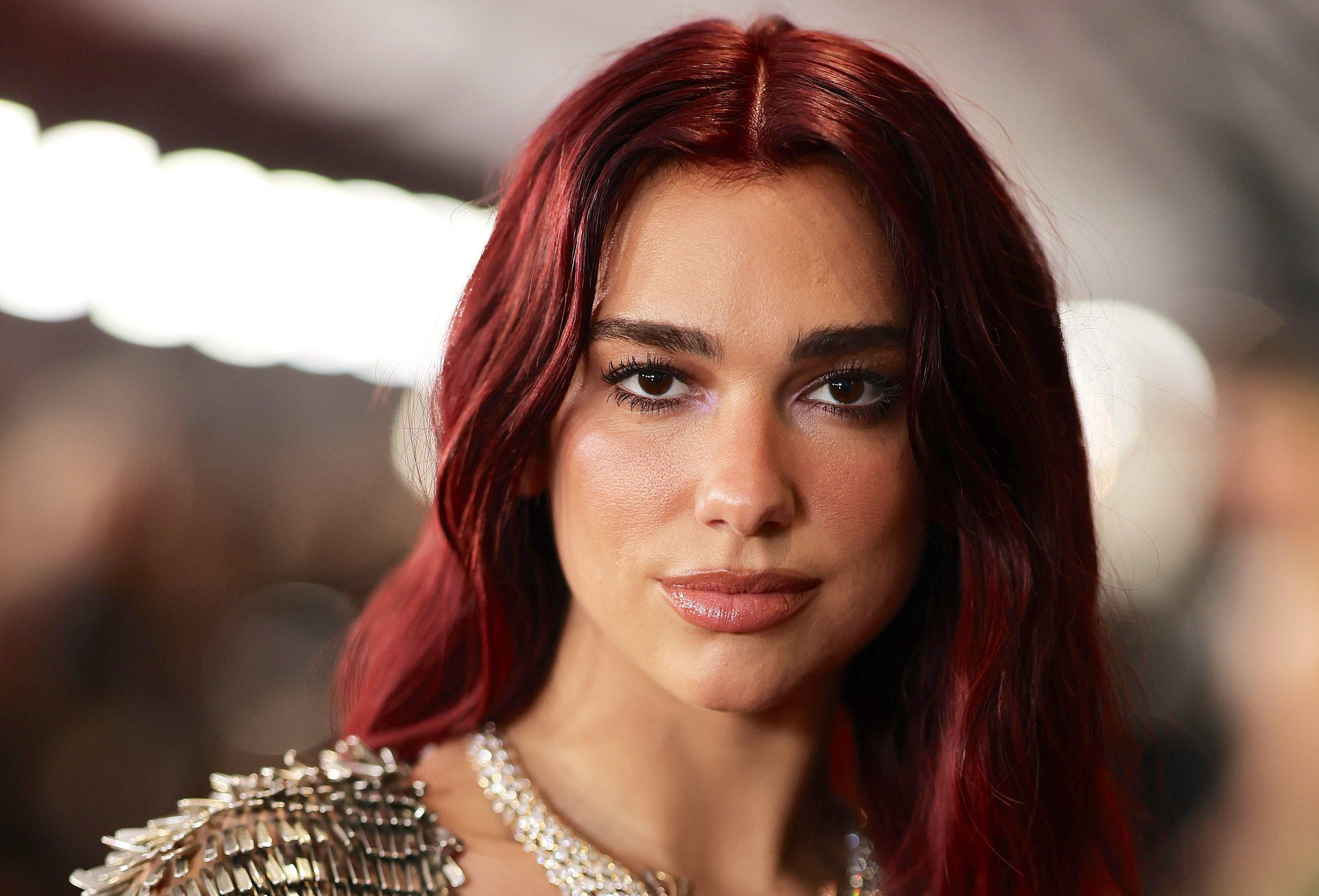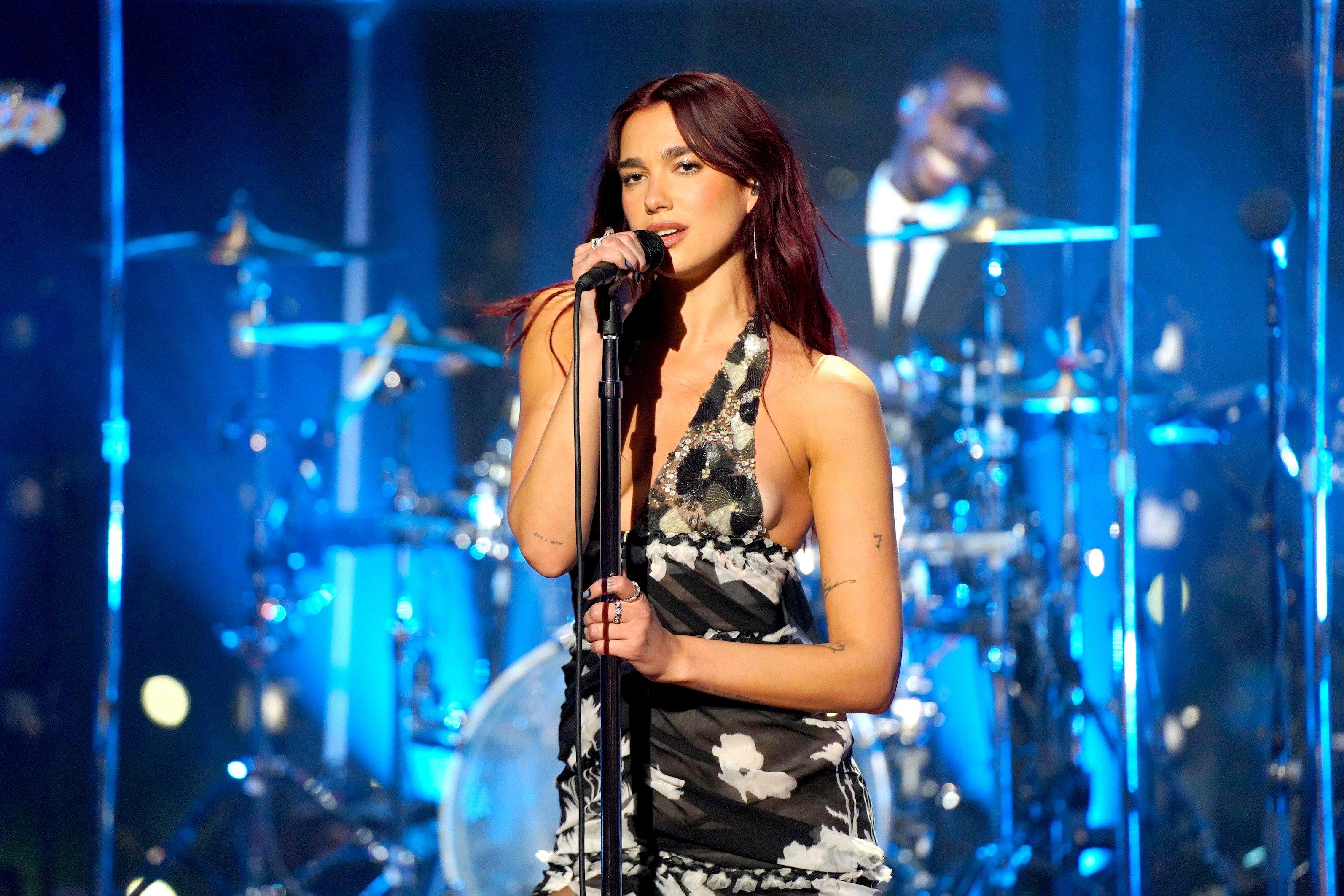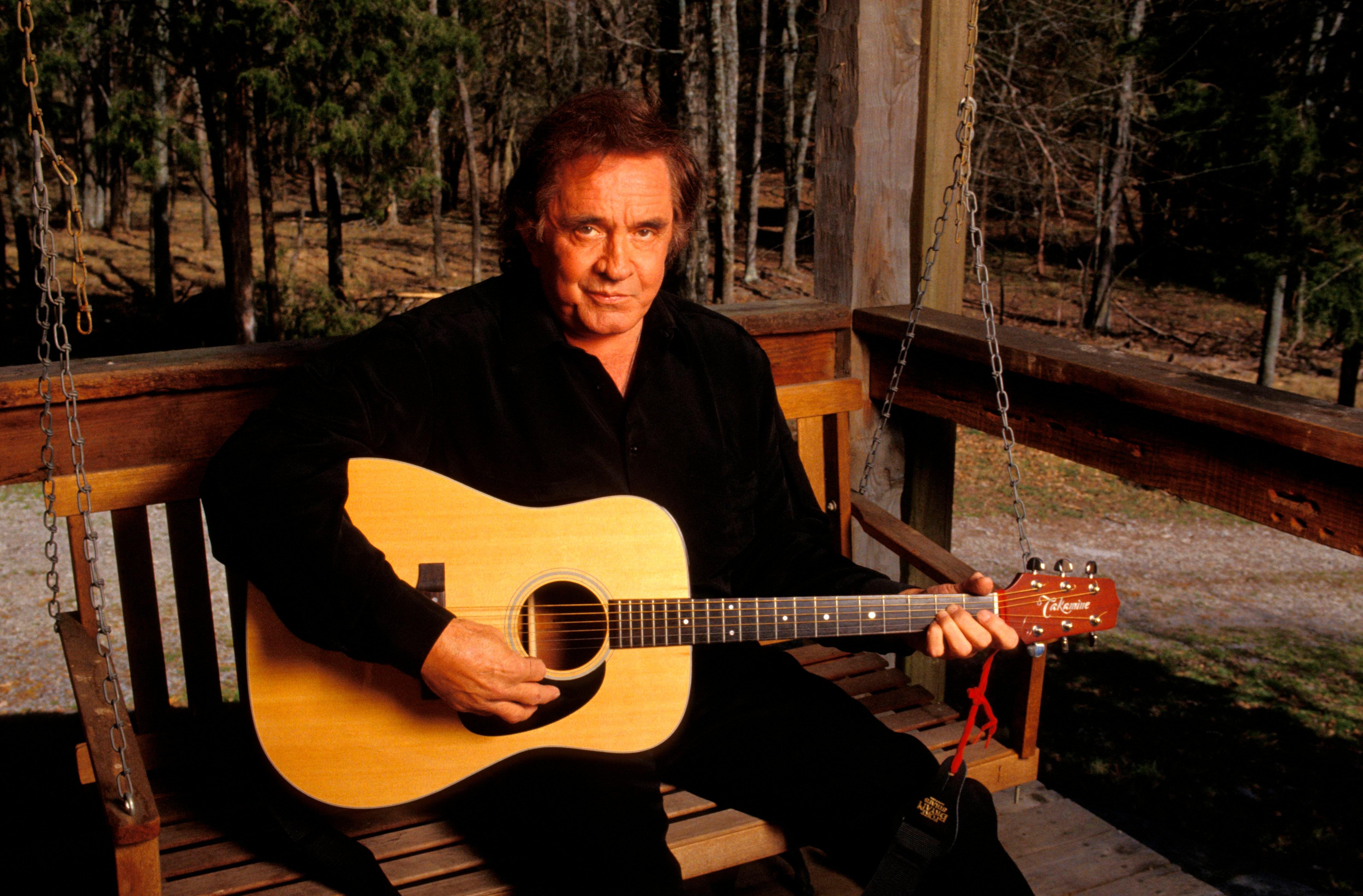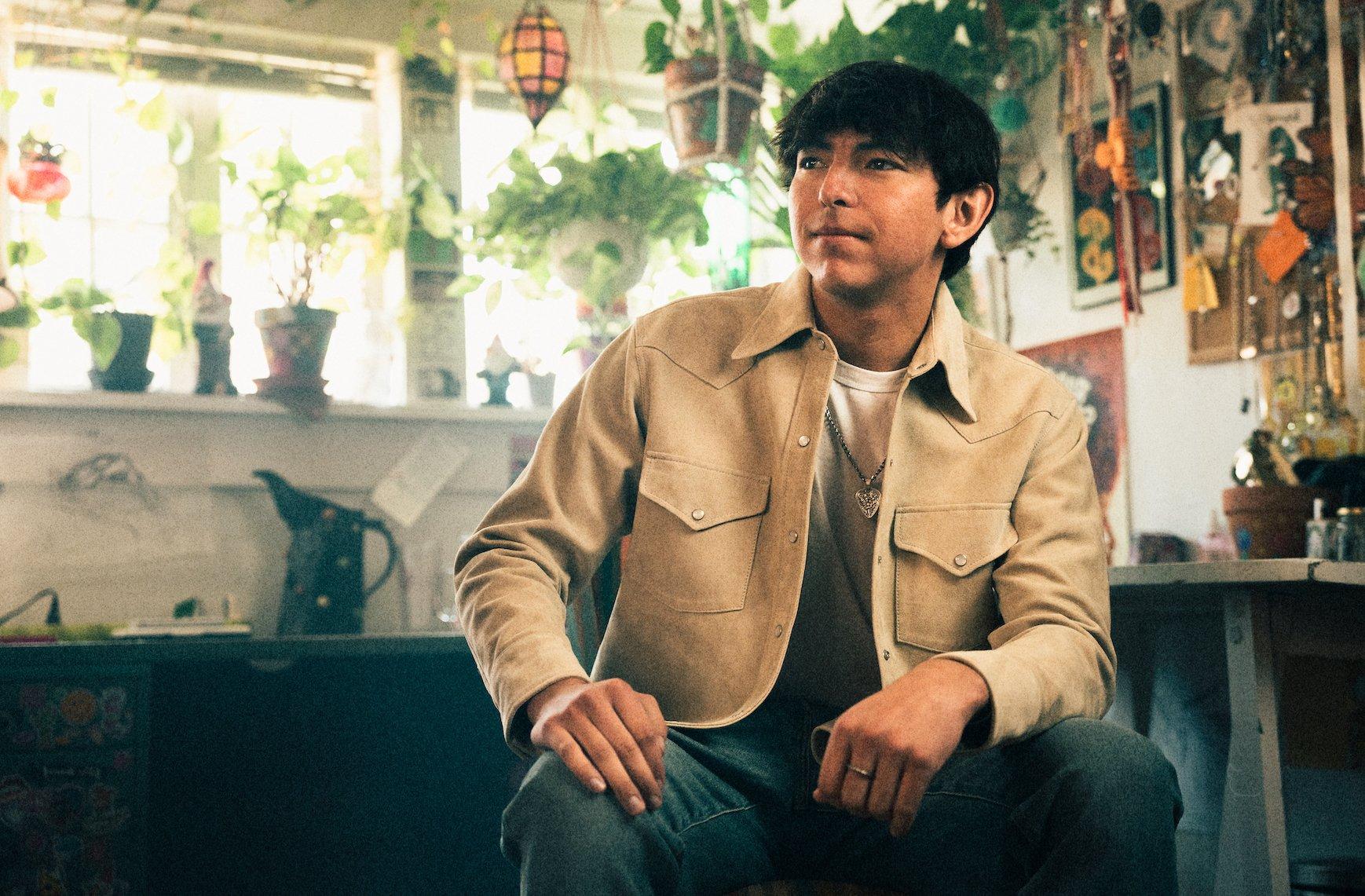When Wyatt Flores released his second EP, Half Life, on April 19, he ended his celebratory Instagram post with one simple wish: "I hope these songs make you feel something."
That's been Flores' mantra since the rising country singer first began releasing music just three years ago. Hailed as one of the genre's most honest new stars, Flores speaks his truth in his red dirt music, on stage, and on social media. As Half Life showcases, he's unafraid to broach life's toughest topics, from suicidal thoughts on "Devil" to a complicated relationship with religion on "I Believe In God."
"I like to keep it very based on what I felt, and just try and go for that emotion," Flores says of his music. "If you can somehow captivate [listeners] in the story and make them feel the emotion through the song, then you've done your job. I guess that's all I'm after."
His unabashed vulnerability has made his music resonate widely — and fast. In 2023, Flores went from playing for hundreds to thousands in a matter of months, garnering more than 325 million global streams and more than 13 million TikTok likes along the way. He consistently uses his rapidly growing platform to champion self-care and mental health, even taking a brief tour hiatus in February to get himself back on track.
Two months later, Flores assures that he's feeling rejuvenated and healthier than ever, sparking some happier tunes that even caught him by surprise (more on that later). He'll spend the summer playing a mix of headlining shows, festival stages and a few supporting slots for Mitski, first kicking things off with his debut at Stagecoach on April 26.
As Flores gears up for tour, he sat down with GRAMMY.com during some time off in his native Oklahoma to chat about his remarkable rise, the complexities of being so vulnerable, and how he feels like he's getting the "best of both worlds."
Do you remember the first show that you were like, "What is happening?"
Yeah, it was Asheville, North Carolina. It was either the last week of April last year or the first week of May, I can't quite remember. But that was my first ever sold-out headline show. I think the venue cap was like 550, and they were screaming so loud that I got off stage and I was like, "Did anyone feel like there was a trash can going off in their ear?" And then my bass player, Bill, was like, "No, that's the last time you'll hear that frequency."
That was where everything changed. It kind of started making me realize how real this was getting. Then, everywhere we went, [it was a] sold-out crowd, and they're excited as all get out. I literally thought that I was living a dream.
I played at, you know, the s—iest hole in the walls you could ever imagine. I just thought I was gonna be there forever. Honestly, I was still having fun doing that. But I just couldn't believe the dramatic change that happened.
At what point did it actually feel real?
It was probably when we played Dallas [in December of] last year. That was the biggest room that we'd ever played. I was like, 3,000 people bought tickets to show up to my show. And then I just kind of had to kind of process like what was actually going on. I kept questioning it for the longest time, but that night it was just different.
We had just played in Fort Worth, like, three months [before that], and that was 600 people. So when we played Dallas, that was when I just looked at the crowd and I was like, Okay, this is it.
That's interesting, because you had to cancel a stretch of shows not long after that. Was that kind of all correlating — taking it in, but being overwhelmed from all of it?
Yeah, because there's a lot of things that went on in my life that I never took the time to process, and that was one of the first things — being like, This is my life from now on. And I think that's what I liked about the Life Lessons project so much, was giving listeners an inside view on what it looks like to be on this side of the fence. Because everyone thinks that it's gotta be the most wild thing to be an artist, but I don't think they realize what comes with it.
I'm still sitting here going, I shouldn't be on this interview with you. I don't deserve it. Like, I don't have the cool style, I show up in sweatshirts and s—ty Adidas shoes. I don't put myself on a pedestal.
I've never wanted to become something I'm not, and that's kind of been the hard point. Because, you know, you got folks from the hometown [saying], "Don't forget who you are!" And then all of a sudden you get lost in all of it. And then you're sitting there going, Do I even know who I am?
Making some healthier changes kind of opened up some other wounds that I bottled up. I never processed my grandpa's death, and at the same time that that was all going down, I was also firing management — which, they say in Nashville, the manager should be the one person that you do trust.
I took one week off so I could come back for [my grandpa's] funeral, and had to delay some shows there. And then I was homeless for two weeks from another situation. But I was like, Nope, I'm just gonna work my ass off. I'm just gonna show up, do what I need to do. And I never took the time to actually look at anything that had happened. And that's kind of where the falloff went, because I was just trying to survive the chaos.
I'm sure it's hard being in the spotlight period while going through so much at the same time.
For a while, there were certain things that I did not like about myself. [I felt like I was] changing personalities. I know most people can't see it, but that was something that I was struggling with. Everyone was seeing how happy I was through social media — because I'm not afraid to post the silly s— that goes down on the road; me being a jackass in the van or something like that — but then people expected that from me.
I had to fully come to terms with, wherever I am in my heart, that's who I am right there in that moment. I don't have to portray this image that people see just because we post it on social media.
I also think it's amazing to have the platform you do and be so honest about how you're feeling. Because it's probably healing for you, but also going to be healing for the people who see it — even if it's challenging and really personal to admit.
I put down my phone for a really long time, which was one of the best things ever. [Laughs.] I came back and I went through my DMs. People were like, "Thank you for saying something because I finally had the encouragement to say something to my wife" or something else. I'm glad that it gave people the encouragement to speak up, because if I don't, then how will they?
I look at my fans, and I'm blessed. There's no better fan base, they're the sweetest people ever. They are diehard fans, but they talk to me like I'm their friend, like they've known me forever. For them to trust someone enough to say something [about] how they feel or what's going on in their lives, that means the absolute world to me.
Clearly that means that what you bring to the table is what your fans are also going to bring to the table for you.
One of the things that I've been trying to work through, is realizing that I can listen to their problems, but I can't take their problems with me. And that was something that I had to learn. I was like, I can't do that to myself, or I'm gonna plummet.
There was a time when we were in Colorado, and someone had sent me these messages [about this girl], and I ended up looking [her] up. She was an eighth grade girl, and the last video she had posted on TikTok was of "Please Don't Go." She'd committed suicide a month after she had posted that. Her mom was trying to raise attention towards bullying and things like that.
It was hard for us. But we had to look at it through a new perspective. And it's like, we can't change someone's decision, as badly as you want to. And we try and look at it from this perspective of, How long did that song keep them here? Time is valuable, and even if it was for another month, at least it kept them here just a little bit longer, kept them through the fight. Even though you don't always win.
We're not just out here playing music. I still love the party songs. "West of Tulsa" is always fun to look out in the crowd, and they're having a great time. But we're not just playing music because we're here to distract people from their problems. We're lucky enough that we do get to save lives, and we get to do it through music. But it's also one of those things where I'm sitting there going, I'm a 22-year-old kid from Oklahoma, and I have this power. Am I going to use it correctly?
Now that you know that your music is so powerful to so many people, has it changed the way that you approach your songwriting?
A little bit. You know, the songs that I write are songs that I feel. I'm ADHD as all get out, so when I show up to write, it's whatever I'm feeling that day. But yeah, there's a little bit in the back of my head that says, Watch out for something like this, you don't want to say the wrong message here.
I want to write these songs that are sad, that are very dark, and lost is kind of the feeling. Because I want people to see that I've gone through it, so that way, they can get a better understanding that they're not the only one.
My inspiration was to be the artist that had those songs that kind of pulled me through my stuff. There's all sorts of jokes and like memes about when the song doesn't hit you hard enough the first time so you play it again, or, like, when you're sitting in a vehicle after you've already gotten home but you sit there until the song ends. That was always kind of a goal for me. I was like, I want to be that song that kind of helps them get through the next day.
That's the way I kind of look at it when I play these shows. And I sit back and I look at the crowd, and I'm like, I get to be a part of y'all's lives every single day, and that is the coolest thing that I've ever done.
It's funny, there's always that interview question like, "What are your goals?" but it sounds like you've already accomplished the main one.
Oh, absolutely. I've been having to find new goals because I've lived my dream. Like, if I died tomorrow, I'd hang my hat proudly. I've helped people, I've played all the venues — well, I guess I haven't played Red Rocks yet. That's coming up, though.
I'm still thinking, because it's just now finally hit me that, like, You've kind of done the damn thing. So it's like, What do you want to do now? I have all these wild ideas. I usually throw out some out of pocket s— and then I let someone else come up with if it's gonna work or not. My business manager hates me. [Laughs.]
Were you raised to be so connected with your feelings, or was it just kind of an innate thing for you?
I think I always felt out of place wherever I was. I was always kind of the weird kid. My friends hated me because I started talking about sappy s—. I'd want to have deep, meaningful conversations and sometimes they'd be like, "Would you just shut up?" [Laughs.]
But what I realized is that I'm very big on connection. At some point, not fitting in and being different kind of all changed for me. I was like, I can't change it, so I might as well be it.
Have you ever questioned how honest you're being in your music?
For the most part, I don't try and hold back. In some ways, it is scary, but in other ways, it's kind of just telling your truth so people don't get shocked by something that you do.
For the first time, I'm writing happier songs. And I'm skeptical to see how people take that. I mean, I've had Life Lessons and stuff like that, but yeah, this is definitely a weird time in my life where I'm like, I'm writing happy songs, and I don't even know how to feel about it. Now, I'm like, How do I share happiness? How do I contain that idea, and that emotion, and put it into a song so it comes out to the listener and they feel it?
You're allowed to be happy! And with everything that's been happening for you lately, I'm not surprised you're happy.
[Fans] always say "We made the right person famous." It's been two short years of really doing this thing. And we're blessed.
I freakin' love playing live, I just had other things going on in the background that I never took time [to process]. For a while, I wanted to blame a lot of things that wasn't it. And then, I went to Onsite [Workshops, a therapy, counseling and wellness retreat center in Tennessee] for like a week and got my head back to normal.
Playing live is what makes it all worth it. I knew that I was going to have to work for this, and I'm getting to see the fruits of my labor. I'm finally getting some time off. I'm getting to actually spend some quality time, but I at least now know how to have quality time in the healthiest way. Because for a while, I couldn't shut the other brain off. I'd come home and I was still somewhere else.
I can't believe that I get the best of both worlds. That usually doesn't happen where you get your cake and eat it too. S—, I might go fishing later! I get to be on the road, play to thousands of people, and then I get to go fishing? I think the only thing that's missing is I don't have a boat. Man, I just might have to weld me one.
Meet Charles Wesley Godwin, The Rising Country Singer Who's Turning "A Very Human Story" Into Stardom




